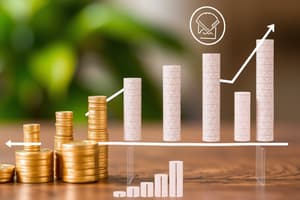Podcast
Questions and Answers
What is the main concept that describes the conflict between unlimited wants and limited resources?
What is the main concept that describes the conflict between unlimited wants and limited resources?
- Market Equilibrium
- Factors of Production
- Scarcity (correct)
- Opportunity Cost
Which of the following is NOT considered a factor of production?
Which of the following is NOT considered a factor of production?
- Land
- Labor
- Technology (correct)
- Capital
What is the primary function of monetary policy?
What is the primary function of monetary policy?
- Regulating monopolies in the market
- Controlling government spending
- Ensuring fair trade practices
- Reducing inflation and managing interest rates (correct)
Which economic sector involves activities like agriculture, fishing, and mining?
Which economic sector involves activities like agriculture, fishing, and mining?
What does 'market equilibrium' refer to in the context of economics?
What does 'market equilibrium' refer to in the context of economics?
Flashcards
Scarcity
Scarcity
The fundamental economic problem where people's unlimited wants meet limited resources.
Demand and Supply
Demand and Supply
The relationship between the quantity of goods consumers want to buy and the quantity that producers are willing to sell at different prices.
Opportunity Cost
Opportunity Cost
The cost of the next best alternative foregone when making a decision.
Market Equilibrium
Market Equilibrium
Signup and view all the flashcards
Factors of Production
Factors of Production
Signup and view all the flashcards
Study Notes
Introduction to Economics
- Economics studies how individuals, businesses, governments, and societies make choices about allocating limited resources to fulfill their needs and wants.
- Economics is divided into microeconomics and macroeconomics.
Key Concepts in Economics
- Scarcity: Unlimited wants clash with limited resources.
- Demand and Supply: The relationship between the quantity of a good or service consumers want to buy and the quantity producers are willing to sell.
- Opportunity Cost: The value of the next best alternative forgone when a choice is made.
- Market Equilibrium: The point where demand equals supply, determining the price of goods and services.
- Factors of Production: Resources used to produce goods and services, like land, labor, and capital.
- Economic Systems: Different ways societies organize their economies, including capitalism, socialism, and mixed economies.
- Inflation: A general increase in prices over time, reducing the purchasing power of money.
- GDP (Gross Domestic Product): The total value of all goods and services produced within a country in a specific period.
- Fiscal Policy: Government decisions on taxation and spending to influence the economy.
- Monetary Policy: Actions by central banks to control the money supply and interest rates to manage the economy.
Economic Sectors
- Primary Sector: Extraction of natural resources (e.g., agriculture, fishing, mining).
- Secondary Sector: Manufacturing and processing of raw materials (e.g., production of finished goods).
- Tertiary Sector: Provision of services (e.g., healthcare, education, retail).
Conclusion
- Economics helps understand how resources are allocated and how markets function.
- Understanding economic concepts helps individuals make informed decisions.
Studying That Suits You
Use AI to generate personalized quizzes and flashcards to suit your learning preferences.




